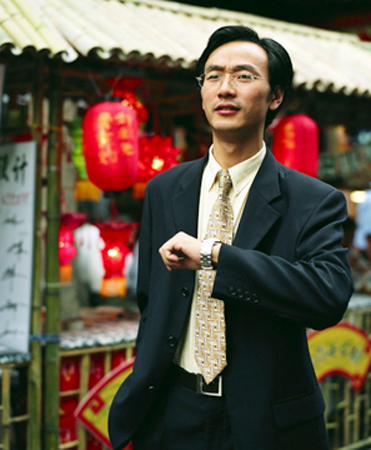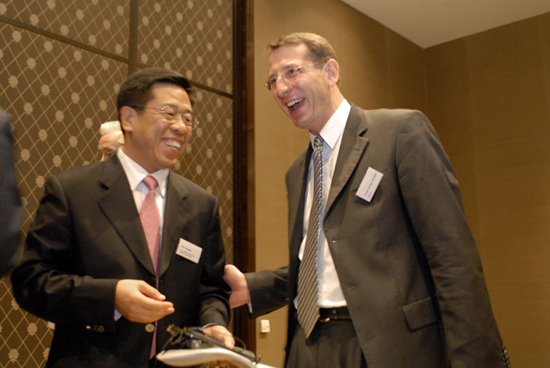Culture and Society: Time Orientation
Perception of Time
The traditional view of time for the Chinese is cyclical in nature, with Chinese widely subscribing to repeated cycles of birth and death, assuming that death is but a path to a new beginning.
The heavy influence from the West in recent decades has superimposed a linear concept of time on the cyclical view. China's long history is also now viewed as a series of events marching sequentially from the past into the future. In Chinese thinking, however, the future is indefinite and, consequently, unreliable. History, on the other hand, creates and informs the present, which is the only time under human control.
Many Chinese are atheists, and in their belief system there is no room for an afterlife. However, a large Buddhist community subscribes to a belief in reincarnation. In addition, Christianity is growing quickly in China, reinforcing a linear view of time that leads to a future afterlife.
Traditional Calendar
The Chinese traditionally used the Chinese calendar, a lunisolar system which has 12 lunar months per year. Because this is shorter than a solar year, an extra month is added each second or third year. The calendar rotates through a 12-year cycle, in which each year is named after an animal whose characteristics are believed to be prevalent in society during that year.
The Gregorian calendar was first introduced to China in 1912, but was accepted only in varying degrees or locations until it was made official in the Republic of China in 1929, and in the People's Republic of China in 1949. This calendar is centered on the birth of Jesus Christ, with each successive year before and after this occasion numbered in ascending order. Dates prior to Christ’s birth are followed by BC (Before Christ), and those after it by AD (for Anno Domini, meaning "In the year of our Lord"). This terminology is sometimes changed to BCE (Before Current Era) and CE (Current Era) in the modern age to be more inclusive of non-Christians. Both continuums begin with year one.
Recognizing the need to respect tradition as well as an ever-expanding global society, the Chinese government observes festivals from both calendars as public holidays. Currently, the government has declared seven legal holidays a year: four that follow the Gregorian calendar and three that correspond to the Chinese one. Four other days that give workers a half day off correspond to the Gregorian dating system.
Attitude Toward Time
A thousand years ago, water-wheel towers were used to track time in China. Although court astrologers rather than commoners used the towers, a respect for time and punctuality is still alive and well in China today. In fact, punctuality is highly regarded as a virtue in the country.
Even though the Chinese value punctuality, they are still a heavily polychronic culture which values people and relationships more than synchronicity with a clock. When a deadline competes for time against a relationship, the deadline loses.
The Chinese expect their trains to run on time, but this demand for punctuality in transportation does not always trickle down to the bus systems throughout the country. Despite this hindrance, the Chinese strive hard to overcome any hurdles keeping them from arriving where they need to be at the appointed hour.
Social Engagements
Social engagements are the one area of life where the Chinese feel it is acceptable to be a little late. Because of the emphasis on maintaining good relationships and saving face, no one takes slight tardiness very seriously.
Business Engagements
Being late for business engagements, however, is practically inexcusable as the Chinese will often see lack of punctuality as a sign of insincerity or thoughtlessness. If a choice needs to be made due to transportation issues, a Chinese often opts to arrive a little early to an appointment rather than late. In fact, arriving early in China is a way of showing esteem for the host.
An exception to this rule is sometimes exercised by those of higher social rank, political status, or authority. It can be quite common for Chinese in this class to arrive intentionally late to show how busy they are.
Business meetings often begin with small talk or socializing. Negotiations are rarely speedy and usually take a great deal of time to complete. It is common for each of the main participants to come to a meeting with their own agenda. When given the chance to speak, they may talk at length over things that do not seem to pertain directly to the key issues at hand. However, since the Chinese tend to be indirect in much of their speech, subtle clues are sometimes being given that when properly understood can reveal both opportunities and barriers to the successful conclusion of the deal on the table.
Extended periods of silence are another distinctive of Chinese business meetings. Participants have the opportunity to reflect on what has been said and take time to formulate a thoughtful responses.
Copyright © 1993—2025 World Trade Press. All rights reserved.

 China
China 
